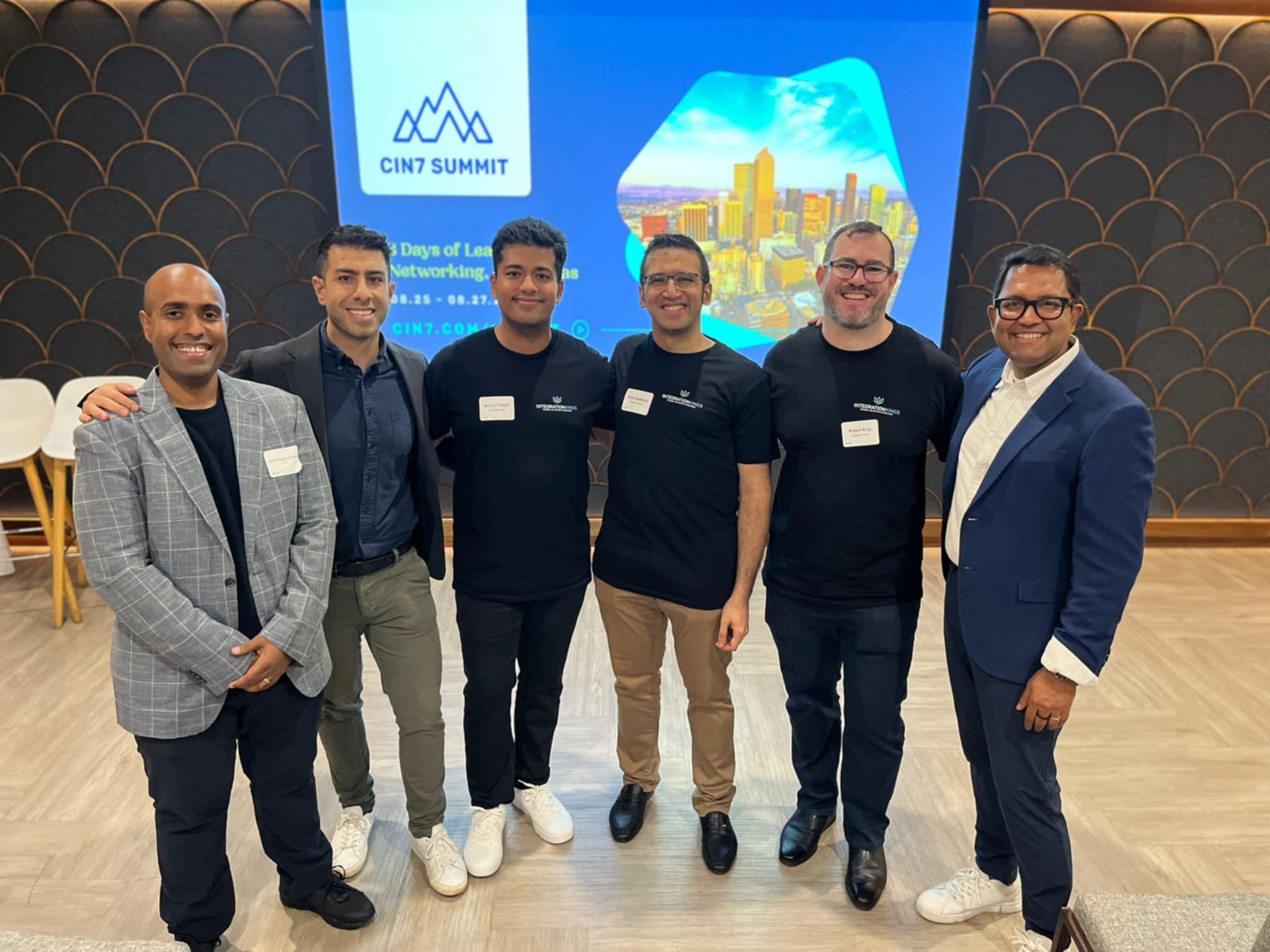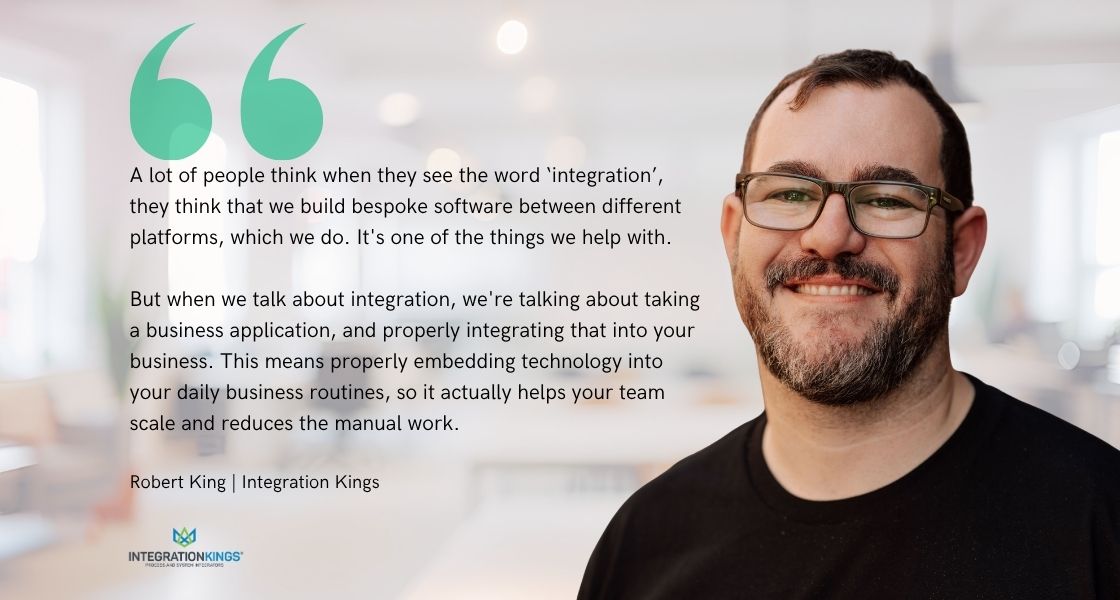Momentum Spotlight: Integration Kings

Robert King (second from right) with the Integration Kings team at the recent Cin7 Partner Summit.
How Integration Kings Is Shaping the Future Through Integration, Impact, and Clarity
At Your Business Momentum, we have the privilege of working with visionary businesses that are redefining what’s possible, and Integration Kings is one of those stories. With a deep understanding of systemisation and a passion for helping businesses thrive, Integration Kings has carved out a unique space as trusted experts in process automation and integration.
We recently connected with Rob King, Co-Founder of Integration Kings, to hear more about the evolution of the business, his approach to creating operational efficiency, and what’s next on the horizon.
Q&A With Rob King of Integration Kings
Tell us about your story and how Integration Kings came to life.
I'm a chartered accountant by background and I started working with Xero as one of the earliest adopters in Australia all the way back to 2009, it is a long time ago. Very early on I could see where we were heading as a community from a business perspective around process and automation via tech.
So in 2014, we set up Integration Kings. The goal of integration Kings is to help businesses understand their business processes requirements and then select the right applications that will run integrated together in the browser to help them scale and automate processes.
We predominantly work with clients that are small to medium, predominantly strong principles around the accounting workflows because that's where the business started from and that is my professional background. But we look after all the other business processes which might be like job costings, CRM, inventory management, payroll, time and attendance. So all those other business processes which can be defined as back office sort of processes.
Most people hear 'integration' and think tech. But how do you define it, and why does it matter to business leaders today?
We get this type of question all the time. A lot of people think when they see the word integration, they think that we build bespoke software between different platforms, which we do.
It's one of the things we help with. But when we talk about integration, we're talking about taking a business application, say like Xero or
Cin7 and properly integrating that into your business, your business daily life routines.
So when we talk about basically integrating technology with the team within the business and using that technology to help bring scalability
into their business and reduce things that should be taken over by technology to run in their businesses.
So when we talk about integration, we mean taking the technology and integrating it into the business properly, not just purely from a business like from building custom software perspective.
What's a real-world problem you see all the time that integration can solve, but most business owners don't even realise it's fixable?
So one of the things we see happen all the time in a lot of the clients who work with is they might be getting an email with a purchase order from the customer and then the only way they could see to get it into their inventory system or their job costing system to create a job or a sale order from is to have staff key that into the applications.
So often business owners are unaware that there's lots of software now available that would read the email and create the sale order or the job order from the email without the staff needing to be involved in keying it. The staff member would still be required to review before that order is pushed into production in the business.
But often we see this as something that people don't realize. It can be fairly well automated, and it's not very expensive at the moment. Like it's becoming more and more cost-effective to do in a business.

You work with all kinds of systems e.g. CRMs, finance tools, project platforms. How do you help clients know what to focus on first?
We have a lot of clients that might have a lot of different things going on in their business and it is always hard to work out what to
focus on first.
Before we change anything in anyone's business, we always take the time as a process to slow down and plan the business out from a big
picture perspective, work out what the tech stack looks like and the strategy and then we always work from the inner functionality of the
business outwards.So typically this means building the block, making sure the building blocks to build the business are scalable.
So making sure a good finance system is in place, an operation platform and CRM functioning together in harmony, then any other apps will sit on top of that, but they become lower priority.
I'm a big believer that if you can't bring confidence into your P&L and balance sheet, then focusing on other functions becomes a distraction. You need that financial clarity first - it's the proof that your business is working.
Because if we don’t know how we’re financially performing, then we’re essentially flying blind.
What's the impact of a well-integrated system on team productivity and client experience?
So if they have a well integrated system that's fully, really well documented and scalable, the benefits for the team productivity is they're focusing on tasks that do really require human touch. So that could be calling a client and interacting or that could be trying to chase a sale.
So we're doing tasks in the business that can't be replaced by technology which is building a business of the future and making sure there's humanity in and from a client experience.
Most of the tasks in a business that can't be replaced by technology nowadays are very human to human orientated which means better client experience because we're focusing on the needs of the customer and the big picture world issues that we set the business up for.
Because when a business is truly well-integrated, the system should take care of the more mundane tasks; the ones that often slow us down and take time away from focusing on our customers.
What trends or tools are you excited about when it comes to system integration and automation?
So I have two tools that I get quite excited about.
We work with a lot of inventory businesses, so we are seeing that if the inventory system is maintained well, that we can bring in a
forecasting AI engine that will help predict for the client, you know, how much to buy and when to buy and invest their capital into the
right products that actually turn over, that make them money from analyzing their historical data, but doing it in such a lightning speed
that they can actually pivot and make decisions on the fly, which previously did without supported data. So that's the first app I'm seeing
and it's really quite exciting.
The other app that I get quite excited about is any type of application that helps take data entry work out of the business and automate it. Because in a lot of businesses, there's a lot of time burned in that space where those staff members could be using their time better spent on servicing customers.
And finally, when you think about the future, what kind of legacy do you hope Integration Kings leaves behind?
The legacy we hope to leave with our clients is that we were approachable, focused on solving real problems, and played a meaningful role in
helping them scale and grow with confidence.
We want clients to think of us as their partner within their business, almost like an extension of their own team that can help them from a
perspective of I'm doing this now and how do I automate it to reduce the work for our team so we can get back to focus on what makes us a
great business.
So we want to be able to leave that legacy behind where our customers actually do feel that we are problem solvers and we can take pain away, but also we can create efficiencies for them and we have a strategic partnership together where we actually become an extension of their business.

The Integration Kings team during a team-building day in the Philippines, delivering expert support, process systemisation, and
automation to clients across the globe.
Integration Kings’ journey is a testament to the power of clarity, systemisation, and staying true to purpose. Rob’s approach to building a values-driven, solutions-focused business shows what’s possible when strategy and execution are aligned, and what it takes to help others do the same.
At Your Business Momentum, we’re proud to collaborate with businesses like Integration Kings, supporting their growth and helping them amplify their impact. Stay tuned for more inspiring stories in our Momentum Spotlight series!
About Momentum Spotlight
Our Momentum Spotlight series celebrates the incredible organisations we’ve had the privilege of working with. Through their stories, we aim to inspire others to embrace growth, leadership, and innovation in their businesses.

.jpg)
.jpg)
.jpg)